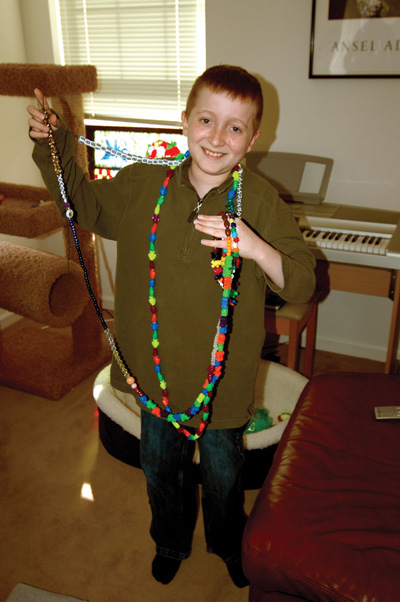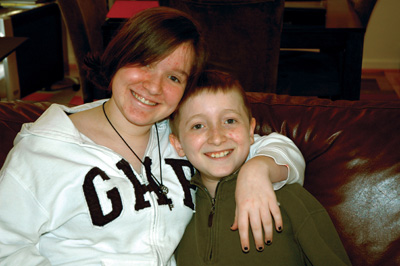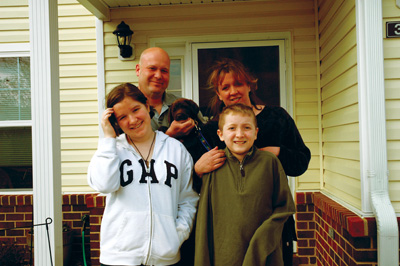By C. Todd Lopez
BOLLING AIR FORCE BASE, Washington, D.C. (April 19, 2007) -- Sometime in March 2006, a school yard game of tag down in San Antonio led to a little boy with a busted nose. That kind of right-of-passage injury happens all the time -- a broken nose, a busted arm, a skinned knee.
But for Keeghan Barry, 10 years old at the time, that broken nose was probably the best bad thing that could have happened to him.

After just a few hours in the emergency room at Wilford Hall Medical Center, the hospital on Lackland Air Force Base, Texas, Keeghan got to go home. The doctors told his parents, Maj. Michael Barry, and mom, Shannon Barry, that at his age, his nose was mostly cartilage. And that meant he'd likely heal up on his own without any complication.
But it wasn't long before there were complications for Keeghan.
"Two or three weeks later he started getting sent home from school almost every day," said Shannon. "It was nausea or headaches in the morning. Some days I wouldn't send him to school, because he woke up complaining of headaches. So I took him to his primary care physician."
The second visit to Wilford Hall yielded a prescription for allergy medication and doctor's orders were to call back if things didn't change. And things didn't change, they just seemed to get worse, Shannon said.
The family doctor finally ordered an MRI exam, short for "magnetic resonance imaging," of Keeghan's head. During the MRI, technicians asked for approval to inject a dye into Keeghan to provide better contrast on the scan. That particular procedure wasn't something his doctor had discussed, and Shannon was initially apprehensive about giving approval.
"The doctor hadn't said anything about that, so I almost told them no," she said. "And Keeghan was afraid of needles. But finally I gave in. He got the injection, and got back in the MRI machine."
Following the exam, the radiologist pulled Shannon aside to talk with her.
"He acted like I was going to completely freak out, and he guided me into a chair," she said. "In a stern voice, he looked at me and said 'Mrs. Barry, your son has a brain tumor.'"
The MRI for suspected complications related to a broken nose, had tipped doctors off to a much greater threat.
The doctor hadn't even said the word "cancer" yet. It would take further tests to reveal that. But Shannon ran from the hospital to her husband, who was out in the parking lot, and broke the news. She said she doesn't remember exactly how her daughter, Mackenzie Barry, known as "Maxx" to her family, found out.
"So much of it is blank now. I don't remember if I told Maxx again, or if she heard me tell Mike about Keeghan's brain tumor," she said. "But she backed away from me and I had to chase her down -- to keep walking after her to grab a hold of her and hug her. She wanted to go home, so I called a friend to come get her."
Keeghan was admitted first to the emergency room and then to the pediatric intensive care unit at the hospital there. That was April 20, just a year ago, when he found out he had the tumor.
It wasn't but five days later, April 25, that Keeghan had his first surgery to excise the tumor from his brain. At the time, he, doctors, and his parents, all believed the tumor was benign.
But after tests had been run on what was removed from his head during the surgery, the family learned that the tumor was not benign. It was cancer, the real thing, in this case called an anaplastic astrocytoma. So on April 28, Keeghan was going to need yet another surgery. The family was shell-shocked by the news. But Keeghan was the strong one, his mother said.

"We were a mess, in tears, having to tell him he had to have a second surgery," she said. "But he got angry with us, he started lecturing us. He said we have to fight together. 'You have to support me and I have to support you and I am going to beat this even if I have to do it cell by cell.' All of us in the room were like, who is this kid?"
That wasn't the first time Keeghan had taken charge of his own illness.
"I told the neurosurgeon at M.D. Anderson Cancer Center that I don't want people making it seem like I'm a child when they talk to me," Keeghan said. "I wanted them telling me what was going on. I want to know the risks and benefits of what they are going to do. Because I have a right to know."
His parents had tried to tell doctors that Keeghan was a little smarter than they might expect.
"We warn doctors, he's not the typical 10 year old," said Major Barry. "And they take what we say with a grain of salt. But every time the doctor directed the conversation towards us, we told them to talk to him."
Keeghan was even allowed to co-signed his informed consent forms along with his parents.
After the second brain surgery, Keeghan underwent a minor surgery to install a medical device in his body. The device, a kind of port, makes it easier for doctors to administer chemotherapy medication and other injections. But by mid-July, just about three months after Keeghan learned of his tumor, doctors said they suspected the tumor in his head was gone.
It was at that time the family made their move to Washington, D.C. Major Barry had been offered a job at Bolling Air Force Base well before anybody knew about Keeghan's cancer. But when he became sick, the Air Force had offered to change the assignment and keep the family in San Antonio, near his doctors. Major Barry let Keeghan make the choice, and his choice was to go to Washington.
"I'd heard about the Smithsonian," Keeghan said, explaining why he chose Washington over San Antonio.
Museums and aquariums are two things he said he's interested in, and two things you can find in the D.C., area.
In January, Keeghan had a fourth, and hopefully final brain surgery to repair a hematoma that had developed in his head. His father said that surgery was normal, as the hematoma was the result of a natural reaction by his body after the tumor was removed.
With all the surgeries done, there are still treatments, tests and injections that Keeghan needs. In fact, he owns a necklace that documents the medical treatment he's endured as a result of his cancer, and adds a different style bead for each procedure he undergoes. Among other things, he's collected four flower beads to represent his surgeries; 20 star beads to represent the MRI, CT, EEG, and MRA tests he's undergone; and 58 fish beads to represent the times doctors put chemotherapy drugs into his injection port.
He doesn't usually wear the necklace, however. It hangs on the wall, because it's about 12 feet long, with a total of 352 beads, representing a total of 29 different types of medical procedures. He said he isn't afraid of needles anymore.
Now Keeghan's a pro on the chemotherapy and brain surgery circuit. His own experience and his knowledge gleaned from talking with doctors and doing research on the Internet have made him something of an expert amongst other kids he meets that have been newly diagnosed with cancer.

"I talk to them about my tumor," he said. "Most of them rely on their parents to tell them what kind of treatment they are getting, but I can tell them what I'm getting and they seem surprised that I know this. I like getting to talk with other kids that are going through the same thing as me -- and asking them about what they think of it."
Keeghan's even got his sister convinced he's an expert.
"Ever since this thing started, he has been 10-times smarter," said Maxx. "He knows more about the human brain than any other 11 year old."
It was doctors that removed the cancer from Keeghan's brain. But the Barry family said they largely depended on each other for support through the ordeal. Maxx, for instance, said it's her job to be the shoulder to cry on for everybody else.
"My job basically is to keep everybody happy," she said. "I'm the rock. Everybody else cries on my shoulder."
Her father agreed.
"Maxx doesn't cry till everybody else is done," he said. "She has been the rock of this family. She has been amazing, now, as a teenager."
Shannon said her family of four has always been tight.
"We have always called ourselves the 'Fantastic Four,'" she said. "Even before this, it's always been about the four of us. We've got each other's back. That's our biggest constant."
Major Barry also credits the Air Force and the other services involved in the joint service medical care that helped save his son's life.
"The Army, Air Force and Navy have done phenomenal work with Keeghan," he said. "The Air Force, for instance, including his primary care manager staying on top of it. And his neurologist at Wilford Hall was an Army doc. He laid it out very clear for everyone to understand, he was a phenomenal doctor. And also the physical therapist at Bethesda."
The Air Force was also very accommodating insofar as flexibility and support, he said. After the Air Force learned of Keeghan's cancer, they offered to let him take another job in San Antonio, so the family could stay there close to the doctors.
Shannon said Keeghan is still in a kind of "maintenance" chemotherapy now, and his hair isn't falling out anymore. Now he has more time now to pursue his own interests, which include sharks, animals, video games with his sister and his rock collection.
Keeghan said he wants to be a marine biologist when he grows up, primarily to study sharks. When he was younger, he learned on television that sharks are remarkably resistant to diseases like cancer. It was then that he set an ironic goal for himself.
"Since I was 5," he said, "I've had the goal to find a cure for cancer."
(Note: Keeghan Barry was diagnosed with a brain tumor in April 2006. He died August 31, 2008. He was 12.)